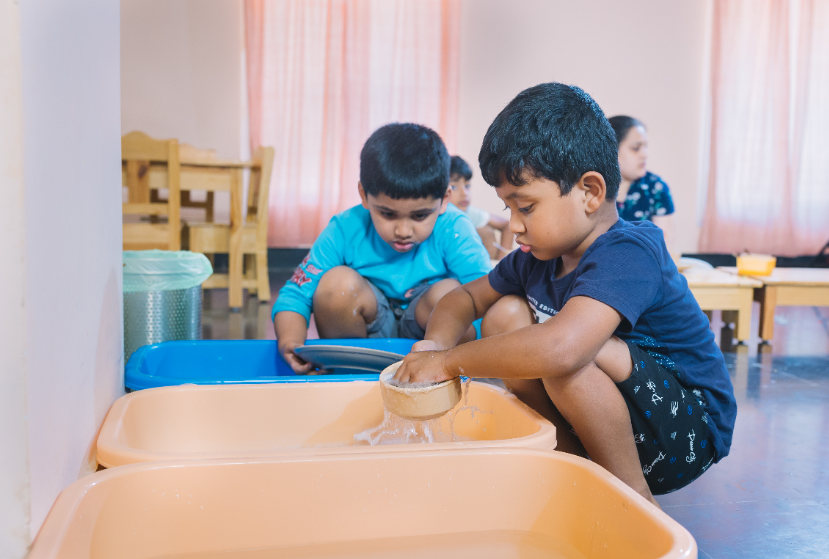When and how to instill discipline and responsibility in children?
Raising children is one of life’s most rewarding and complex journeys. As parents and educators, we often wonder: When should we start teaching discipline? How can we help children become responsible without fear or pressure? The answers lie in timing, approach, and empathy.
Discipline and responsibility are not just about rules and consequences. They are about helping children understand their place in the world, make thoughtful choices, and contribute meaningfully to their environment. These values are nurtured early, and the way we approach them shapes the child’s long-term emotional and social health.
Start Early, But Start Gently
The seeds of discipline and responsibility can be planted in the earliest years of a child's life. But these early lessons don’t come from punishments or rigid schedules. They come from rhythm, consistency, and modeling.
In many best kindergarten schools for early education, the foundation of discipline is laid through predictable daily routines, clear expectations, and gentle transitions. When children know what comes next, they feel secure. And when they are part of that rhythm, they begin to take ownership of their day.
Understanding Discipline as Guidance, Not Punishment
One of the key child discipline strategies in schools today is moving away from punishment and toward natural and logical consequences. Instead of instilling fear, effective discipline helps children make the connection between actions and outcomes.
For example, if a child forgets their toy outside and it gets wet, the consequence is part of the learning. There’s no need for scolding. Over time, children learn that responsibility comes with care, attention, and thought.
In this model, discipline is not imposed. It is understood.
Role Modeling and Home Environment
Children absorb far more from what they see than from what they are told. If parents take responsibility for their mistakes, keep promises, and treat others with respect, children naturally mirror these behaviors.
Some of the most effective parenting tips for raising responsible kids involve inviting children into small, age-appropriate responsibilities. These might include:
- Putting away their toys
- Helping serve food or clean up
- Caring for pets or plants
- Taking responsibility for their choices
This doesn’t mean perfection or pressure. It means steady encouragement, letting children feel the pride of being contributors to their family and classroom.
The School's Role in Shaping Responsibility
When you're choosing the right kindergarten for your child, it’s important to understand how the school approaches behavior, responsibility, and independence.
At Swechha Waldorf Inspired School, for example, discipline isn’t enforced from the outside. It is cultivated from within. Teachers use storytelling, rhythm, and repetition to help children understand social boundaries and interpersonal care. Classrooms are designed to be collaborative, not competitive. When a child spills something, another child often volunteers to help clean up. Responsibility becomes a shared value, not a burden.
Evoking Images, Not Reactions
Responsibility need not be taught to harsh reactions or detailed logical explanations. A child who rushed to stack the plates and dropped it is in an agitated state of mind. A strong reaction from the adult or lengthy explanation to correct the child are both harmful.
A kind nod of understanding with an image to remember like “Gentle hands keep plates safe” is always effective.
In a Waldorf Kindergarten, instructions are replaced with imaginative pictures for children.
“Golden hands are being gentle”
“Happy feet are slowing down”
“The toys like to be held gently”
“The brush likes to dance lightly”
Images give opportunities for intrinsic reflection for children while minimizing the fallout of the impact. And that is the root of responsibility.
The Role of Rhythm and Routine
Discipline isn’t about rigid schedules. But routines create a sense of order that helps children feel grounded. Morning greetings, mealtimes, cleanup songs, and end-of-day rituals help build internal discipline through rhythm.
At schools like Swechha, this rhythm becomes the invisible guide. It creates space for choice within structure, which helps children thrive.
Letting Children Try—and Fail
Responsibility also grows when children are allowed to make mistakes in a safe, supportive environment. Rather than shielding them from discomfort, let them experience small setbacks. When a tower falls, or a peer says "no," children learn resilience and repair.
Give them tools to try again. Let them know you’re there, but you believe in their ability to figure it out. That belief is powerful.
Consistency Is Key
Whatever strategies you use—at home or in school—consistency builds trust. When expectations change frequently, children feel uncertain. But when boundaries are clear and kind, children begin to internalize them.
This doesn’t mean being inflexible. It means being dependable.
Conclusion: Growing Responsible, Grounded Humans
Discipline and responsibility are not quick lessons. They are lifelong values shaped by the everyday choices we make as parents and educators.
Whether it’s setting up gentle routines, choosing stories that model kindness, or picking a school that emphasizes inner growth over outward performance, the goal is the same: raising children who understand the value of their actions.
If you’re in the process of choosing the right kindergarten for your child, consider not only academics but also the school’s approach to social-emotional growth. Ask how they handle conflict, how they support emotional development, and how they build a sense of community.
At Swechha, we believe that discipline begins with respect. And responsibility begins with trust. Because children, when met with patience and purpose, grow into remarkable human beings.
